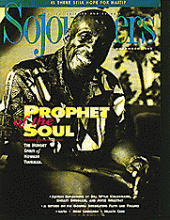Vincent Harding was professor of religion and social transformation at Iliff School of Theology, a Sojourners contributing editor, and a noted civil rights historian and author when this article appeared. Interviewed by Julie Polter, he was asked to comment on Howard Thurman's influence on the civil rights movement. - The Editors
Howard Thurman assumed always that if the Christian faith was to have any authenticity, it had to have some critical, crucial, central word and deed that would address itself to situations of human beings mistreating other human beings and separating themselves from one another. There could be no viable Christian faith that did not address directly the terror of segregation and what it did to human lives.
He was like a constant live background and undergirding for all of us who were engaged in the [civil rights] movement out of a religious foundation. He was a presence that confirmed that it was right for us to be there as carriers of the faith.
Thurman was asking us to take Jesus of Nazareth seriously as the source of our strength, as the source of our hope, as the source of our insight into what life was supposed to be about. Whenever Jesus of Nazareth, in our understanding of Jesus and his way, ran counter to what American Christianity was saying and doing about itself, Thurman said to be faithful to Jesus of Nazareth and the religion of Jesus.
Even though he would never put himself in this category, his work provided the foundation for a great deal of what we call liberation theology and black theology. But it was for him Jesus theology. Though they were very, very different, he would stand closely with Clarence Jordan in this matter of taking Jesus of Nazareth very seriously.
Read the Full Article

